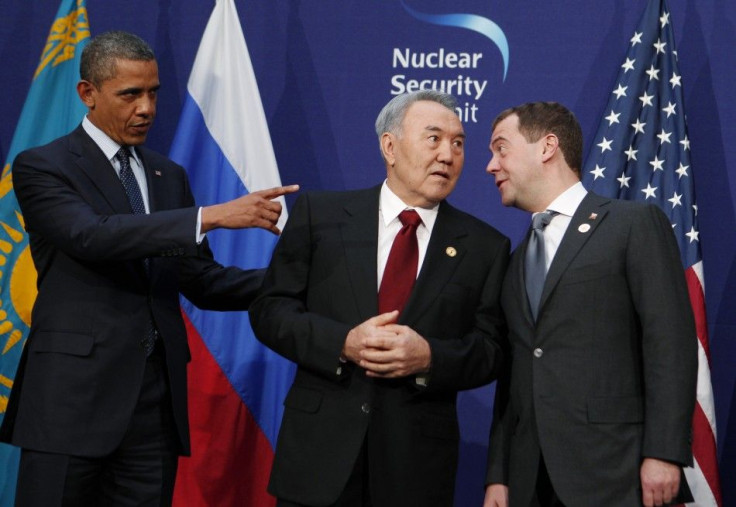Romney Hits Obama On Foreign Policy After Russia 'Flexibility' Comment

As the Obama administration goes into damage control over an unscripted exchange between President Barack Obama and Russian President Dmitri Medvedev, Mitt Romney is seeking to turn the gaffe into a broader indictment of the president's foreign policy.
Unaware that a nearby microphone was on, Obama told Medvedev on Monday that he would have more flexibility to negotiate on contentious issues like missile defense after the 2012 presidential election. The president later defended his choice of words as a straightforward reference to the difficulty of tackling thorny issues during a highly partisan election year.
I don't think it's any surprise you can't start a few months before a presidential and congressional election in the United States, and at a time when they just completed elections in Russia and they are in the process of a presidential transition where a new president's going to be coming in a little less than two months, Obama said.
Obama's Critics Bounce
But critics of the president quickly pounced, saying the comment suggests that Obama has been disingenuous with the American people. In an op-ed entitled Bowing to the Kremlin, Romney warned that the president was determined to ingratiate himself with the Kremlin and suggested that Obama would carry a conciliatory foreign policy into his second term.
Would post-election 'flexibility' lead him to reach out once again to the Iranian regime 'without preconditions'? Romney wrote. Would it lead him to resume pressuring Israel into making unilateral concessions to the Palestinians? Would it permit him to take an even softer line, if that is imaginable, toward the authoritarian regimes of the Castro brothers and Hugo Chávez?
Romney, who is looking increasingly likely to be Obama's Republican challenger in the fall, has long sought to portray the president as weak on foreign policy. He has characterized Obama's actions abroad as feckless and tantamount to waving the white flag of surrender.
2009: New Era For US - Russia Relations
Obama announced early on that he was seeking a reset in U.S.-Russian relations, a stance that has produced some notable compromises. He forged an agreement with Russia to reduce both countries' nuclear stockpiles, and early in his presidency he abandoned plans to build a missile defense shield in the Czech Republican and Poland that Russia stridently opposed.
Although the arms treaty passed with considerable bipartisan support, Republicans have long denounced Obama for scrapping the missile shield -- Senate Majority Leader Mitch McConnell at the time called the decision shortsighted and harmful to our long-term security interests -- and Obama's comments to Medvedev provided Romney with a new opening.
Across the board, [Russia] has been a thorn in our side on questions vital to America's national security, Romney wrote in the op-ed. For three years, the sum total of President Obama's policy toward Russia has been: 'We give, Russia gets.'
Romney also cited Russia's foot-dragging on leveling sanctions against Iran and Moscow's refusal to renounce its support for Syrian president Bashar al-Assad. In an appearance on The Tonight Show With Jay Leno, Romney resisted Leno's suggestion that Obama's conversation with Medvedev was an example of politics as usual.
The comment suggests that [Obama] has a different agenda he's going to pursue once the American people aren't watching, Romney said.
Romney also disagreed when Leno suggested that Russia is closer to America than the people we perceive as our enemies, citing Russia' support for authoritarian regimes like Assad's and that of Venezuela's president Hugo Chavez.
They basically stand up for the world's worst actors, and when America tries to put pressure on those actors with sanctions or other U.N. actions, Russia always stands up for what I would consider to be the world's worst leaders, Romney said, adding to applause that if they were like us, they'd be speaking in favor of freedom as opposed to opposing it.
--
© Copyright IBTimes 2024. All rights reserved.




















